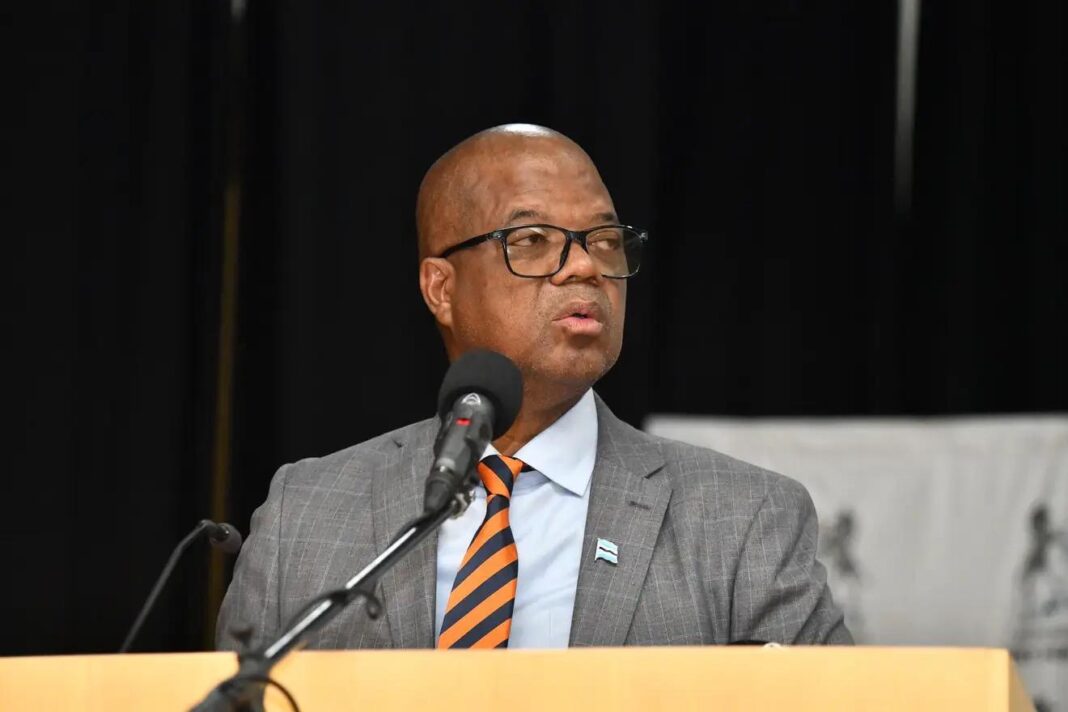Botswana is embarking on a significant economic journey with the establishment of its own sovereign wealth fund, the Botswana Sovereign Wealth Fund Limited (BSWFL). This strategic move signals the nation’s forward-looking vision, designed to secure its economic future and ensure lasting prosperity for generations to come. Registered as a public company on May 27, 2025, and wholly owned by the Government of Botswana, the BSWFL operates directly under the Office of the President in Gaborone, underscoring its national importance. Its overarching goal is the long-term management and investment of national funds and resources, aiming for growth without compromising the sustainability of Botswana’s economy.
The placement of the BSWFL as a public company wholly owned by the government and operating directly under the Office of the President is more than an administrative detail. This structure reflects a deliberate decision to embed the fund at the core of national strategic planning, providing it with direct political backing and strong central oversight from the highest office. Such a high-level placement indicates that the fund is perceived as a critical instrument for national development and economic resilience, rather than merely a detached financial vehicle. This arrangement aims to ensure close alignment with broader national objectives and potentially streamline decision-making during its foundational phases. However, this central control also necessitates the implementation of robust internal governance frameworks to effectively mitigate the risk of short-term political interference, a challenge commonly observed in sovereign wealth funds globally.
What Exactly is a Sovereign Wealth Fund?
A sovereign wealth fund (SWF) is an investment fund owned by a state, utilised by governments to invest surplus revenues and other financial reserves. These funds are characterized by a dual nature, serving both non-financial objectives, such as domestic political and social policy aims, and purely financial goals, focused on protecting and expanding the capital entrusted to them.
SWFs are typically financed through various mechanisms:
Commodity Revenues: Many nations, particularly those rich in natural resources like oil, natural gas, or, in Botswana’s context, diamonds, channel surplus profits into SWFs. This strategy helps insulate their economies from volatile price swings and contributes to long-term financial stability.
Foreign Exchange Reserves: Some countries convert excess foreign currency reserves into investment funds to generate higher returns than traditional reserve holdings.
Fiscal Surpluses: Governments with budget surpluses may opt to invest these funds in an SWF rather than spending them immediately.
The establishment of SWFs serves several core purposes for nations:
Economic Stabilisation: They act as a buffer, cushioning economies from the volatility inherent in commodity prices, which can otherwise lead to significant economic fluctuations.
Wealth Preservation: By investing surplus revenues, governments aim to ensure that future generations will continue to benefit from the nation’s current resource wealth, preventing its depletion.
Diversification: SWFs assist governments in diversifying national income sources beyond reliance on a single commodity or traditional tax revenues, thereby strengthening economic resilience.
Strategic Influence: Some funds engage in investments in specific industries or regions that align with national economic or geopolitical interests, extending a country’s influence.
The dual nature of sovereign wealth funds, encompassing both non-financial and purely financial objectives, presents an inherent tension. While the financial goal of protecting and expanding capital is clear, the pursuit of non-financial goals—such as supporting domestic industries, addressing social policy needs, or making politically motivated strategic investments—can sometimes lead to decisions that may not prioritize maximum financial return. For instance, a fund might be compelled to invest domestically in a venture with lower profitability for social benefit, or to support a politically favored industry, potentially foregoing higher returns available in global markets. For the BSWFL, this implies that its long-term success will depend not only on its investment acumen but also on its ability to effectively balance these potentially competing objectives. Establishing clear governance frameworks is therefore essential to manage this inherent tension, ensuring that political or social mandates do not unduly compromise the fund’s financial sustainability and its primary goal of long-term wealth creation.
Global Blueprint: Lessons from Successful Funds
Many countries have successfully leveraged sovereign wealth funds to manage their national wealth and secure their economic futures. Examining these global precedents provides valuable insights for Botswana’s new endeavour.
Intergenerational Wealth Preservation
Norway’s Government Pension Fund Global (GPFG): This fund, largely fueled by vast revenues from North Sea oil, is a prime example of successful long-term wealth management. Its strategy focuses on maximising the international purchasing power of its assets while maintaining a moderate level of risk. The GPFG achieves this through extensive global diversification across equities, bonds, and real estate, generating recurring income from dividends, interest payments, and rent. It is also recognised for its responsible investment strategy, which includes active company dialogue and a commitment to transparency. A key factor in its success is its high capacity to absorb risk, allowing it to adhere to a long-term strategy despite considerable fluctuations in annual returns. The fund’s approach is predicated on the belief in largely well-functioning financial markets and the ability to capture risk premiums associated with market risk.
Singapore’s Temasek Holdings: As a Singapore-based investment company, Temasek Holdings manages a diversified portfolio across various sectors, geographies, and asset classes, including significant investments in Singapore-based companies and global direct investments. Its investment strategy emphasizes active management, sustainability, strategic partnerships, and a long-term perspective. This approach has yielded substantial results, with Temasek delivering a 14% annualized shareholder return since its inception in 1974 and significantly growing its net portfolio value. The diversification inherent in its strategy is crucial for reducing risk and volatility, enabling the portfolio to withstand market fluctuations and economic downturns.
Abu Dhabi Investment Authority (ADIA): Established in 1976 to secure Abu Dhabi’s future from oil revenues, ADIA operates with a distinct long-term focus and a global investment mandate. A cornerstone of its success is its operational independence from domestic political and regulatory considerations, allowing it to concentrate solely on generating financial returns. ADIA attributes its outperformance primarily to its asset allocation strategy, employing a structured yet flexible approach to respond quickly to new opportunities. Its robust risk management framework provides comprehensive visibility of all risk sources, and it was an early investor in new asset classes such as private equity and hedge funds. This combination of independence, long-term vision, and diversified global investment has resulted in over four decades of positive, inflation-adjusted returns.
Kuwait Investment Authority (KIA): The Kuwait Investment Authority holds the distinction of being the world’s first sovereign wealth fund, established in 1953 to manage oil revenues. Its pioneering role laid the groundwork for long-term wealth management for commodity-rich nations, demonstrating the foresight required to plan beyond immediate resource extraction.
Kiribati Revenue Equalisation Reserve Fund: This fund, established in 1956, manages taxes from guano exports. Despite the exhaustion of the commodity (guano) in 1979, the fund remains a key economic contributor to Kiribati, highlighting its effectiveness in long-term wealth preservation and demonstrating how a nation can secure its economic future even after its primary natural resource is depleted.
The historical experience of countries like Norway, where initial oil windfalls in the 1970s and 1980s were largely spent immediately despite efforts to set aside funds, serves as a significant lesson. This pattern, often termed the “resource curse,” illustrates how commodity-rich nations can fail to save and diversify their economies, leading to instability when commodity prices fluctuate. Botswana, as a diamond-rich nation, is positioned to learn from such precedents. The establishment of the BSWFL, therefore, signals a proactive and mature approach, prioritising long-term savings and investment for intergenerational equity, thereby aiming to avoid the pitfalls of immediate consumption of resource wealth and fostering sustainable economic development.
Botswana’s Own Fund: Purpose and Principles
The Botswana Sovereign Wealth Fund Limited (BSWFL) is formally registered as a public company, with the Government of Botswana as its sole shareholder, holding all 3,000 shares. Its constitutional mandate, detailed in Part II, Clause 2 of its founding document, outlines a clear set of objects and core purposes:
Securing Long-Term Economic Future: The fund is established to accept and manage funds, assets, and other resources from the Government. Its primary objective is to secure Botswana’s economic future through long-term management and investment, ensuring the growth of these resources without compromising the nation’s economic sustainability.
Identifying and Executing Investment Opportunities: The BSWFL is tasked with researching, identifying, and executing investment opportunities. These activities are to be conducted both locally and internationally, based on sound economic and financial principles.
Adherence to Global Standards: A fundamental commitment of the BSWFL is to conduct its affairs in accordance with globally accepted standards for governance, investment, and risk management practices for sovereign wealth funds. This explicitly includes adherence to the Santiago Principles, which are the “Sovereign Wealth Funds Generally Accepted Principles and Practices” established in October 2008.
Strict Capital Reinvestment Policy: A critical provision stipulates that capital injected into the Company is to be reinvested. The Board is explicitly prohibited from distributing any capital held by the Company to the Shareholder (the Government) unless two very specific and exceptional conditions are met: either approval by Parliament following certification by the Minister of Finance that “exceptional economic circumstances” exist warranting such a distribution, or under a state of public emergency declared by the President of Botswana. Dividends, however, can only be declared from the Company’s “Annual Net Profits”.
Enhancing Fiscal and Macroeconomic Stability: The fund aims to enhance Botswana’s fiscal sustainability and macroeconomic stability, thereby safeguarding and preserving national wealth for future generations.
Broad Investment Powers: The BSWFL possesses extensive powers to acquire, sell, hold, and otherwise deal with all kinds of property—whether real, personal, tangible, or intangible. It can also purchase, hold, sell, and transfer shares, bonds, and debentures.
The constitutional clauses mandating the reinvestment of capital and imposing stringent conditions for distributing any capital (allowing only annual net profits for dividends, and even then, requiring parliamentary approval or a state of emergency for capital distributions) are powerful legal safeguards. This framework directly addresses and mitigates the temptation for governments to access the fund for immediate fiscal needs or political expediency, a practice that has undermined the long-term viability of other sovereign wealth funds. This mechanism prioritizes the long-term preservation and growth of the fund’s principal over short-term spending, ensuring its enduring financial integrity. This robust legal foundation is crucial for building public confidence and international investor trust in the BSWFL’s unwavering commitment to its long-term mandate, clearly distinguishing it from a mere government account.
The governance structure of the BSWFL, outlined in Part X of its Constitution regarding the Board of Directors, is designed to ensure professional management and accountability. The Board is responsible for managing the company’s affairs and reports to the Shareholder (the Government). It will comprise a minimum of seven and a maximum of eleven directors, including the Managing Director. Directors are appointed, removed, and replaced by the Minister (from the Office of the President). A critical safeguard embedded in the constitution is that Government Representatives (from the Ministry for State President, Ministry of Finance, and Bank of Botswana) “shall not constitute a majority of the Board.” The remaining director positions are reserved for the Managing Director, independent financial and other relevant experts, and representatives for national interest or civil society. Furthermore, no person holding elected political office is eligible for appointment as a Director, and the Minister appoints the Chairman of the Board.
The specific stipulations within the BSWFL’s constitution—that Government Representatives cannot form a majority on the Board, alongside the inclusion of independent financial experts and civil society representatives, and the prohibition of elected political office holders—represent a direct structural response to the well-documented risk of “political capture” in sovereign wealth funds. By deliberately limiting the influence of government officials and incorporating diverse expertise and civil society perspectives, the fund aims to foster independent decision-making. This design promotes choices based on financial prudence and long-term national benefit, rather than being swayed by short-term political agendas. This proactive governance design is a significant measure to ensure that the BSWFL’s investment decisions are driven by sound economic principles and global best practices, thereby enhancing its resilience and credibility.
What This Means for Batswana: Impact and Promise
The establishment of the Botswana Sovereign Wealth Fund Limited carries profound implications for the citizens of Botswana, translating macroeconomic stability into tangible benefits for daily lives and future opportunities.
Economic Stability and Resilience: The fund is poised to act as a vital buffer against fluctuations in commodity prices, particularly diamonds, which are central to Botswana’s economy. By stabilizing national revenues, the BSWFL will help provide more predictable funding for essential government services, reducing the nation’s vulnerability to external economic shocks and fostering a stronger foundation for private sector growth and job creation.
Intergenerational Equity: A core purpose of the fund is to preserve and grow national wealth. This commitment ensures that future generations of Batswana will continue to benefit from the nation’s current resource endowments, rather than seeing them depleted. It represents a direct, long-term investment in the nation’s collective future.
Diversification of National Income: Through its diversified investment strategy across a broad range of assets—including stocks, bonds, real estate, and private equity—the BSWFL will help broaden Botswana’s national income sources. This strategic diversification reduces the country’s reliance on a single commodity, enhancing overall economic stability and reducing risk.
Potential for Future Development Funding: While the fund’s capital is primarily intended for reinvestment, its “Annual Net Profits” can be distributed to the Shareholder (the Government). This mechanism means that, over the long term, the BSWFL could become a sustainable and growing source of revenue, indirectly supporting public initiatives, critical infrastructure development, and various social programs across the country.
Enhanced International Standing: The BSWFL’s commitment to globally accepted standards, such as the Santiago Principles, will significantly boost Botswana’s reputation as a responsible, transparent, and prudently managed financial actor on the global stage. This enhanced international standing can attract further foreign investment and strengthen international partnerships.
The fund’s objective to enhance fiscal sustainability and macroeconomic stability, while seemingly abstract, directly translates into concrete advantages for citizens. A stable economy provides more predictable government services, reduces the impact of external shocks (such as a decline in diamond prices on employment or public spending), and creates a more robust environment for private sector expansion and job creation. Thus, the BSWFL is not merely an instrument for accumulating financial assets; it is a strategic tool designed to cultivate a more resilient and predictable economic environment, directly influencing the daily lives and future opportunities available to all Batswana.
The Road Ahead: Expected Outcomes for BSWFL
The establishment of the Botswana Sovereign Wealth Fund Limited is a long-term endeavour, with its true success measured over decades rather than just a few years. Patience and consistent adherence to its mandate will be paramount for its effectiveness.
The expected results from the BSWFL include:
Sustainable Returns: Through professional and diversified investment management, the fund aims to generate consistent, healthy financial returns over time.
Increased National Wealth: Over the long term, the fund is anticipated to significantly grow Botswana’s financial reserves, creating a larger pool of national wealth that can be leveraged for future national priorities.
Improved Economic Resilience: A robust sovereign wealth fund will enable Botswana to better withstand global economic downturns and the inherent volatility of commodity prices, ensuring greater economic stability.
However, the journey will not be without its challenges, necessitating strong safeguards:
Maintaining Independence: A continuous challenge will be to safeguard the fund’s operational independence from short-term political pressures. The constitutional provisions regarding the composition of the Board (ensuring a non-majority of government representatives) and the strict conditions for capital distribution are crucial mechanisms designed to protect this independence.
Transparency and Accountability: Ongoing adherence to the Santiago Principles and the implementation of robust internal governance will be vital for maintaining public trust and ensuring effective, ethical management.
Navigating Global Markets: The fund will require highly skilled management to navigate the complexities and inherent volatility of global investment landscapes, adapting strategies to changing economic conditions.
While the BSWFL’s constitution lays out strong governance principles—including an independent board majority, the exclusion of political office holders, adherence to the Santiago Principles, and strict rules for capital distribution—the ultimate success of any sovereign wealth fund depends on the consistent application and rigorous enforcement of these rules. Global examples illustrate that even well-designed funds can face challenges such as political capture or a lack of transparency if vigilance is not maintained. Therefore, the long-term success of the BSWFL will require continuous public and parliamentary oversight, strong ethical leadership from its board and management, and a commitment to transparency that extends beyond mere compliance, ensuring that the fund truly serves the enduring interests of all Batswana.
In conclusion, the establishment of the Botswana Sovereign Wealth Fund Limited marks a pivotal moment in the nation’s economic strategy. By embracing principles of long-term investment, diversification, and robust governance, Botswana is laying a solid foundation to secure its economic future, ensuring prosperity and stability for generations to come, and reinforcing its commitment to prudent financial management on the global stage.



